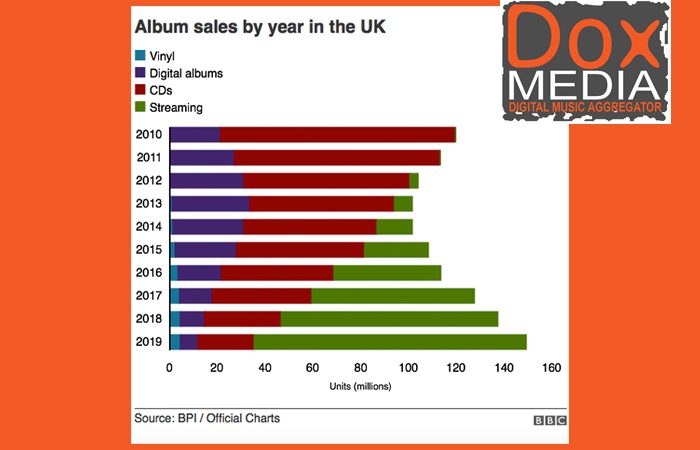UK music sales year on year update
The BBC recently published an article on their website about the latest UK music sales year on year figures. It’s important to note that these figures are for official music sales outlets only and do not include/take into account sales of releases and ‘physical’ products (such as CD and vinyl) made directly by artists to their fans and supporters via their own sites, social media and gigs
The BBC article reports:
DIGITAL – the industry is now dominated by streaming – with fans cueing up 114 billion songs in 2019, a new record. According to trade body the BPI, streaming is now responsible for three-quarters of “album equivalent sales” – the metric used by the industry to convert consumption on services like Spotify and Amazon Music into album sales (generally speaking, 1,000 streams generate one “sale”). Just three years ago, the technology was only responsible for 36% of album sales.
VINYL – Vinyl sales also rose again in 2019, this year by 4.1%, with the format now accounting for one in every eight albums bought in the UK. Big-sellers included Liam Gallagher’s latest album, Billie Eilish’s debut album When We All Fall Asleep, Where Do We Go? and perennial classics like Fleetwood Mac’s Rumours and Queen’s Greatest Hits.
CASSETTES – Cassettes also proved surprisingly popular with more than 80,000 tapes sold in 2019 – the highest figure since 2004. The tally was boosted by Robbie Williams’ number one album A Christmas Present, which sold more than 10,000 cassette copies in a single week in December. However, his success had more to do with marketing than a sudden surge in affection for the format – the cassettes were sold as part of a merchandise bundle on his website, packaged with signed copies of the CD.
The popularity of cassettes and vinyl “shows fans still love a physical, tangible music artefact in their hands”, said Vanessa Higgins, chief executive of music label Regent Street Records.
Overall, 154 million albums were either streamed, bought or or downloaded in 2019 – the largest amount since 2006, when the figure stood at 161.4 million.
Geoff Taylor, head of the BPI, said the latest figures proved British music had a bright future. “Strong demand for streaming music and vinyl, fuelled by the investment and innovation of UK labels in discovering and promoting new talent, boosted music consumption to levels not seen for 15 years,” he said. “But the full benefits of this growth can only be unlocked if our new government takes action to make the UK more competitive and encourage further investment, to require digital platforms to pay fairly for music and filter out illegal content, and to give all our schoolchildren the opportunity to play an instrument and discover the joy of making music.”
One area not covered by the report was the split of format preferences with different age groups. The general perseption (and our observation) is the older the target audience for an artist/group’s music the higher percentage of sales will be made up of physical products such as CD and vinyl. Also, whatever the age group, an artist/group is always more likely to sell physical products direct to fans at their gigs and performances.




